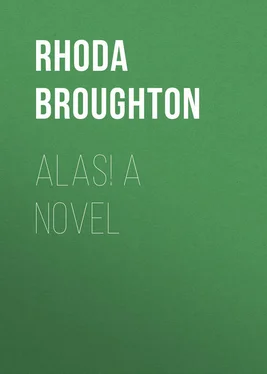Rhoda Broughton - Alas! A Novel
Здесь есть возможность читать онлайн «Rhoda Broughton - Alas! A Novel» — ознакомительный отрывок электронной книги совершенно бесплатно, а после прочтения отрывка купить полную версию. В некоторых случаях можно слушать аудио, скачать через торрент в формате fb2 и присутствует краткое содержание. ISBN: , Жанр: foreign_antique, foreign_prose, на английском языке. Описание произведения, (предисловие) а так же отзывы посетителей доступны на портале библиотеки ЛибКат.
- Название:Alas! A Novel
- Автор:
- Жанр:
- Год:неизвестен
- ISBN:http://www.gutenberg.org/ebooks/34428
- Рейтинг книги:4 / 5. Голосов: 1
-
Избранное:Добавить в избранное
- Отзывы:
-
Ваша оценка:
- 80
- 1
- 2
- 3
- 4
- 5
Alas! A Novel: краткое содержание, описание и аннотация
Предлагаем к чтению аннотацию, описание, краткое содержание или предисловие (зависит от того, что написал сам автор книги «Alas! A Novel»). Если вы не нашли необходимую информацию о книге — напишите в комментариях, мы постараемся отыскать её.
Alas! A Novel — читать онлайн ознакомительный отрывок
Ниже представлен текст книги, разбитый по страницам. Система сохранения места последней прочитанной страницы, позволяет с удобством читать онлайн бесплатно книгу «Alas! A Novel», без необходимости каждый раз заново искать на чём Вы остановились. Поставьте закладку, и сможете в любой момент перейти на страницу, на которой закончили чтение.
Интервал:
Закладка:
Burgoyne is pacing along a brown walk, like a raised causeway, with a sheet of white water on either hand, rolling strong ripples to the bank. Gnarled willows stand islanded in the coldly argent water. A blackbird is flying out of the bushes, with a surprised look at finding himself turned into a sea-bird. No sun; an even sweep of dull silver to right and left. No sun; and yet as he looks, after days of rain, the " grand décorateur ," as someone happily called him, rides out in royalty on a cleared sky-field, turning the whole drenched country into mother-of-pearl – a sheet of opal stretched across the drowned meadows; the distance opal too, a delicate, dainty, evanescent loveliness snatched from the ugly brown jaws of winter.
Burgoyne is leaning over the wooden bridge beneath which, in its normal state, the water of the lasher rushes down impetuously; but it is now raised to such a height that it lies level, almost flush with the planking. He is staring across the iridescent water-plain to where, in the poetic atmosphere of sun and mist, dome, and schools and soaring spires stand etherealized.
"Dear old place!" he says, under his breath, "everybody is dead; and I am dead; and Brown is deader than anyone. I am glad that you, at least, are still alive!"
Are these more ghosts coming round the corner? A man and a woman ghost strolling along, and looking about them as strangers look. When they are within a pace or two of him the woman says something – something about the floods – to her companion, and at the sound Burgoyne starts.
"She did not speak last night; if she had spoken I should have known her at once. She always had such a sweet voice."
He raises his arms from the bridge-top, and, turning, meets them face to face, eye to eye, and in an instant he has seen that both recognise him. At the same instant he is aware of a simultaneous inclination on the part of man and wife to avert their heads, and pass him without claiming his acquaintance. Perhaps, if he had had time to reflect, he would have allowed them to do so, but the impulse of the moment forbids it. Why should they wish to cut him? What has he done to deserve it? Ten years ago, they were his very good friends, and he was the familiar comrade of their children, the daily guest at their table. What has the unavoidable lapse of those years done to make him less fit for their company at twenty-nine than he was at nineteen? There must be some misconception, which a moment will set right.
"I am afraid that you do not remember me, Mrs. Le Marchant," he says, lifting his hat.
This is not quite true, as he is perfectly convinced that they are as much aware of his identity as he is of theirs. But what formula has a man to employ in such a case? They both look back at him with a sort of irresolution. To his astonishment, in their eyes is a velleity of flight, but apparently she – women's minds moving more quickly than men's – is the first to realize that flight is out of the question.
"I am sure that you have no intention of cutting me," Jim goes on, with a smile, seeing that she is apparently struggling with a difficulty in utterance; "at least, you must be very much changed from what you were ten years ago if you have. My name is – "
"I know – I know!" she interrupts, finding speech at last – speech low and hurried. "I remember perfectly. You are Mr. Burgoyne."
Her confusion – she used always to be such a placid, even-mannered woman – is so patent, born of whatever unaccountable feeling it may be, that he now heartily wishes he had let the poor woman pass unmolested. But such repentance is too late. He has arrested her; she is standing on the gravel path before him, and though he feels that her extraordinary shyness — mauvaise honte , whatever it may be – has infected himself, he must make some further remark to her. Nothing better occurs to him than the obvious one:
"It is a long time – it is ten years since we met."
"Yes, ten years; it must be quite ten years," she assents, evidently making a great effort to regain composure.
She does not feign the slightest pleasure in the meeting, and Burgoyne feels that the one thought that occupies her mind is how she can soonest end it. But his roused curiosity, together with the difficulty of parting without further observation after having forced his presence upon them, combine to prevent her succeeding.
"And how is the Moat?" he asks, reflecting that this, at least, is a safe question; a brick and mortar house, at all events, cannot be dead. "How is Devonshire?"
Apparently it is not so harmless a question as he had imagined; at least, Mrs. Le Marchant is obviously quite incapable of answering it. Her husband, for the first time, comes to her rescue.
"The Moat is let," he says, in a dry voice; "we have left Devonshire a long while – nine, nine and a half years ago."
The Moat let! Judging by the light of Burgoyne's recollections, it would have seemed less surprising to him to hear that Windsor Castle had been turned into a Joint Stock Company Hotel. It is probably, then, some money trouble that has turned Mrs. Le Marchant's hair white – snow white, as he now sees it to be. But no; he rejects the explanation as insufficient. She is not the woman to have taken a diminished income so much to heart.
Good manners forbid him to ask, "Why is the Moat let?" so all that he says is, "Nine and a half years ago? Why, that must have been very soon after I left Devonshire."
He addresses his remark involuntarily rather to the wife than the husband, but she does not answer it. Her eyes are fixed upon the bubbles sailing so fast upon the swollen river, which is distinguishable only by its current from the sameness of the surrounding water. A lark – there is always a lark in Mesopotamia – a tiny, strong-throated singer, that never seems to have to stop to take breath, fills up the silence, shouting somewhere out of sight among the black clouds, in and out of which the uncertain sun is plunging. Whether of a moneyed nature or not, there is evidently something very unpleasant connected with their leaving their native county and their immemorial home, so he had better get away from the subject as fast as possible.
"Anyhow," he says, with a rather nervous smile, "I hope that the world has been treating you kindly – that things have gone well with you since those dear old days when you were so good to me."
There is an instant's pause – perhaps he would not have noticed it had not his suspicions been already roused – before the husband, again taking upon him the task of replying, answers, with a sort of laboured carelessness:
"Oh, yes, thanks; we do not complain. It has not been a very rosy time for landlords lately, as you are aware."
"And you ?" cries the wife, striking in with a species of hurry in her voice – a hurry due, as his instinct tells him, to the fact of her fear of his entering into more detailed inquiries. "And you ? We must not forget you. Have you been well, flourishing, all this long time? Do you still live with your – "
She stops abruptly. It is apparent that she has entirely forgotten what was the species of relation with whom he lived. There is a little tinge of bitterness in his heart, though not in his tone, as he supplies the missing word "aunt." After all, he had forgotten her name; why should not she forget his aunt?
"With my aunt? Well, I never exactly lived with her; I made, and make my headquarters there when I am in England, which is not very often. I have been a rolling stone; I have rolled pretty well round the world since we parted."
They do not care in the least where he has rolled, nor how much nor how little moss he has collected in the process. They are only thinking how they can best get rid of him. But the past is strong upon him; he cannot let them slide out of his life again for another ten – twenty years perhaps, without finding out from them something about his five merry playmates. His inquiry must needs be a vague one. Who dares ask specifically after this or that man, woman, or even child, when ten years have rolled their tides between?
Читать дальшеИнтервал:
Закладка:
Похожие книги на «Alas! A Novel»
Представляем Вашему вниманию похожие книги на «Alas! A Novel» списком для выбора. Мы отобрали схожую по названию и смыслу литературу в надежде предоставить читателям больше вариантов отыскать новые, интересные, ещё непрочитанные произведения.
Обсуждение, отзывы о книге «Alas! A Novel» и просто собственные мнения читателей. Оставьте ваши комментарии, напишите, что Вы думаете о произведении, его смысле или главных героях. Укажите что конкретно понравилось, а что нет, и почему Вы так считаете.












